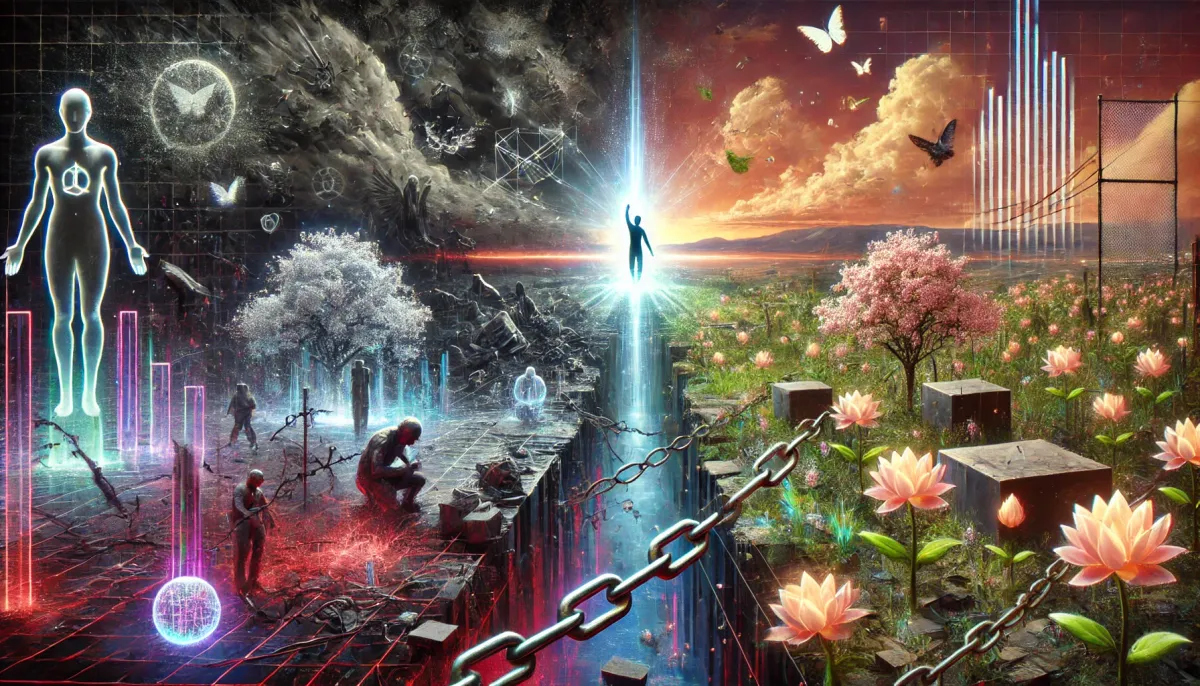Our Beliefs - Chapter Four

Previously, we’ve emphasized the importance of treating everyone we encounter as real, fully autonomous individuals. Realizing that there are no NPCs with us in this reality challenges us to recognize the intrinsic value of every person. When we acknowledge that each person’s experiences, emotions, and thoughts are as genuine as our own, it becomes clear that any form of dehumanization is a profound moral failing. This understanding compels us to examine the pervasive and destructive nature of racism within our society.
Racism is deeply ingrained in all societies, often appearing in forms that can seem harmless to those who benefit from the status quo. For many who are part of the in-group—typically those who share the dominant racial or ethnic identity—racism may be something they rarely, if ever, confront directly. This creates a dangerous illusion that racism is not a serious problem, or that it is limited to a few overt acts of hatred. However, this perception is a privilege, born from a position where the everyday propaganda that devalues others based on their race is not aimed at them.
For those outside this privileged group, the experience is markedly different. Racism is not a distant or abstract concept but a lived reality that impacts every aspect of life—from opportunities in education and employment to interactions with law enforcement and access to healthcare. What many in the in-group perceive as harmless forms of racism—stereotypes, microaggressions, or cultural appropriation—serve to reinforce a social hierarchy that privileges one group over others, maintaining systemic inequalities.
This perception of harmlessness in racism is not just a personal failing but part of a broader, more insidious process. Fascist ideologies, which thrive on dehumanization, take this normalization of othering to its extreme, turning subtle prejudices into systematic oppression. Fascism normalizes the idea that some people are inherently superior to others, which justifies the oppression, exclusion, or even elimination of those deemed "inferior."
In fascist societies, propaganda is pervasive, constantly reinforcing who belongs and who does not. For those within the in-group, this messaging can be so ubiquitous and subtle that it blends into the background, almost unnoticed. It shapes their worldview without them needing to actively engage with it. As a result, the othering of marginalized groups becomes normalized, seen not as an act of cruelty or injustice but as a necessary means of maintaining societal order.
This normalization is incredibly dangerous because it allows racism and other forms of bigotry to become entrenched within the fabric of society. When the in-group accepts this othering as normal, they become complicit in the perpetuation of systemic injustice, even if they do not personally engage in overtly racist acts. This complicity can be as simple as failing to speak out against racist jokes, supporting policies that disproportionately harm marginalized communities, or turning a blind eye to the suffering of others.
The consequences of this normalization are catastrophic. It leads to a society where injustice is institutionalized, and the humanity of entire groups of people is systematically denied. This can manifest in countless ways: from discriminatory laws and policies to acts of violence and genocide. When racism is normalized, it becomes nearly invisible to those who benefit from it, allowing it to persist and evolve unchecked. For those who are marginalized, the consequences are devastating. They are forced to live in a world that constantly reinforces their perceived inferiority, limiting their opportunities, eroding their sense of self-worth, and subjecting them to constant threats of violence and discrimination.
Recognizing racist attitudes within yourself is a difficult but vital step toward becoming an ally in the fight against systemic injustice. Begin by decentering yourself—seek out and listen to marginalized voices without interjecting your own experiences. Commit to lifelong learning and unlearning by regularly engaging with anti-racist literature and media. Reflect on your biases and privileges, and engage in difficult conversations about race, even when they make you uncomfortable. Take tangible actions to support marginalized communities—whether through donations, volunteering, or using your platform to amplify voices that are often silenced. Remember, dismantling racism is not a one-time act but a continuous journey of growth, understanding, and active engagement.
In our simulated reality, where every action and attitude can ripple outwards to affect the entire system, the stakes are high. The Church of the First Simulation calls on its members to reject all forms of racism and othering, recognizing that these are not just moral failings but fundamental glitches in the system that threaten the well-being of all participants. By refusing to accept racism as normal, we can begin to repair the damage it has caused and move towards a more just and equitable world; one we are creating together.